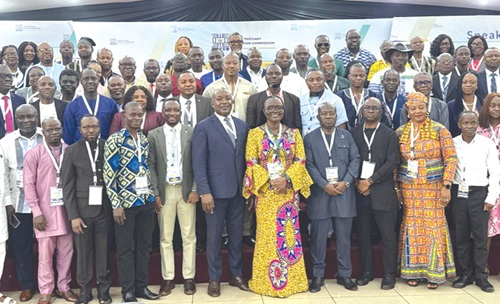The Chairman of the Ghana National Research Fund (GNRF), Professor Eric Yirenkyi Danquah, has underscored the need for a sustainable research fund towards national development.
He stated that, owing to inequalities in the world, Ghanaian scientists and other researchers would find it difficult to access funding that would enable them to conduct research to tackle both local and global issues.
“Therefore, it is important for Ghana to fund its own scientists and researchers so that they can develop African solutions to African problems,” he stressed.
Prof. Danquah, who is also the Founding Director, West Africa Centre for Crop Improvement (WACCI), was speaking during the 2025 Summer School at the Great Hall of the Kwame Nkrumah University of Science and Technology (KNUST).
The two-day event, organised by the Ghana Tertiary Education Commission (GTEC), was on the theme: “Building a sustainable national development through research: Strengthening capacity across Ghana’s tertiary education institutions”.
The ceremony, which brought together Vice-Chancellors, Pro Vice-Chancellors, Principals of Colleges of Education and Heads of health training institutions, among others, was aimed at fostering a deeper understanding of the strategic role research plays in national development and to enhance the research capacity within the tertiary institutions.
He stated that a sustainable research fund was important since no one was going to fund researchers to research to solve Ghana’s problems, saying, “as a nation, we need to have the capacity to fund our research”.
Opportune time
Because of this, he said the operationalisation of the national research fund with a seed of GH¢50 m had come at the opportune time to enable scientists to access funding for their research work.
“At the moment, the research fund with a seed grant of GH¢50m and 0.5 per cent of the national budget is a great start for us as a country because it is very historic,” he stressed and further commended the government for putting together the fund’s governing board to oversee its operations.
He indicated that the fund was considering opportunities for accessing additional funding so that they could hit the ground running, adding, “according to the Malabo declaration, African governments are expected to put one per cent of Gross Domestic Product (GDP) and not 0.5 per cent of national budget into research”.
Revise Act
To achieve this, he called for the revision of the Ghana National Research Fund Act established under Act 1056 in 2020 to pave the way for one per cent of GDP to be paid into the fund to enhance research works, urging the government to take steps towards reviewing the Act.
Also, he said there was a need for work to be done on the Legislative Instruments (LIs) for approval by Parliament so that the fund would be governed by rules and regulations, stressing, “This will not allow people to use their heads in making decisions relating to the research fund”.
Theme
The Director General, GTEC, Prof. Ahmed Abdulai Jinapor, said the theme reflected not only national aspirations but also the urgent need to reposition research as a driver of sustainable development, innovation and equity in education.
“Let us build a future where research is not the preserve of a few institutions, but the lifeblood of our entire tertiary education system,” he said and further indicated that the event was to give opportunity to the participants to understand basic research that would be impactful in the country.
“The Summer School is intended to assist faculties and build their capacities to source funding for the individual institutions they work for,” he added.
Unattainable
In a welcome address, the Vice-Chancellor, KNUST, Prof. Rita Akosua Dickson, said national development was simply unattainable without a well-coordinated, adequately resourced and locally relevant research ecosystem.
Writer’s email: gilbert.agbey@graphic.com.gh.

